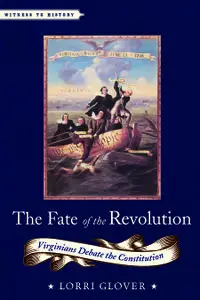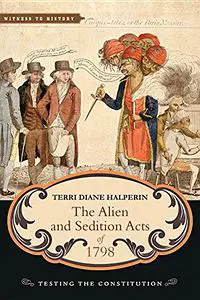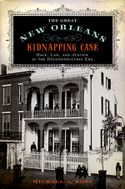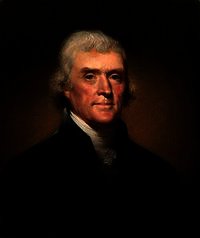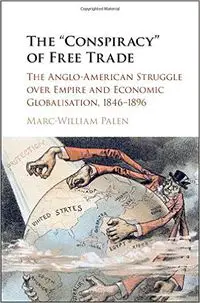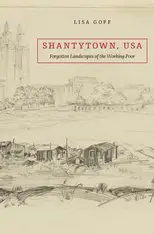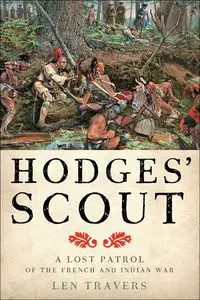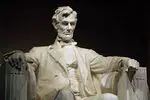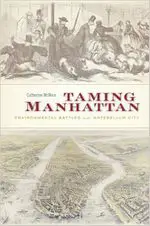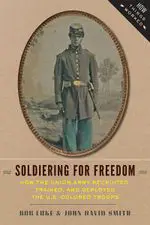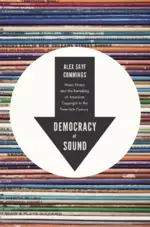Difference between revisions of "Portal:Interviews"
| Line 1: | Line 1: | ||
__NOTOC__ | __NOTOC__ | ||
{{Mediawiki:Banner}} | {{Mediawiki:Banner}} | ||
| − | |||
<div class="portal" style="width:85%;"> | <div class="portal" style="width:85%;"> | ||
| − | + | [[File:VDC_book_cover.jpg|thumbnail|left|200px]] | |
| + | ==[[Fate of the Revolution: Interview with Lorri Glover]]== | ||
| + | Starting in 1787, states began to ratify the newly drafted federal Constitution which would determine the fate of the new American Republic. In order for the Constitution to go in effect, nine of the states needed to agree to the document. While five states quickly ratified the Constitution between December 1787 and January 1788, the country's eyes stayed on Virginia. Virginia was the most populated and largest state and it was critical for the state to ratify the Constitution to legitimize the process. {{Read more|Fate of the Revolution: Interview with Lorri Glover}} | ||
| + | </div> | ||
| + | <div class="portal" style="width:85%;"> | ||
| + | [[File:The_Alien_and_Sedition_Acts_of_1789.jpg|thumbnail|left|200px]] | ||
| + | ==[[The Alien and Sedition Acts of 1798: Interview with Terri Halperin]]== | ||
| + | The Alien and Sedition Acts of 1798 were four laws that were passed by the predominantly Federalist Congress and signed by John Adams to strengthen the national security of the United States. These acts not only restricted the ability of an immigrant to become a citizen, but made it easier to deport non-citizens who were either deemed dangerous or were citizens of hostile countries. Perhaps the most contentious aspect of the new laws criminalized the printing or speaking allegedly false statements about the federal government. Not surprisingly, these laws were incredibly controversial and strongly opposed by Thomas Jefferson's opposition Democratic-Republican party.{{Read more|The Alien and Sedition Acts of 1798: Interview with Terri Halperin}} | ||
| + | </div> | ||
| + | <div class="portal"> | ||
==[[Voodoo, Kidnapping and Race in New Orleans during Reconstruction: Interview with Michael A. Ross]]== | ==[[Voodoo, Kidnapping and Race in New Orleans during Reconstruction: Interview with Michael A. Ross]]== | ||
| − | |||
| − | |||
[[File:NOLA kidnapping jacket photo (2).jpg|left|thumb|125px]] | [[File:NOLA kidnapping jacket photo (2).jpg|left|thumb|125px]] | ||
In October, the Oxford University Press will be publishing The Great New Orleans Kidnapping Case: Race, Law, and Justice in the Reconstruction Era by Michael A. Ross, an Associate Professor at the University of Maryland. | In October, the Oxford University Press will be publishing The Great New Orleans Kidnapping Case: Race, Law, and Justice in the Reconstruction Era by Michael A. Ross, an Associate Professor at the University of Maryland. | ||
{{Read more|Interview:Voodoo, Kidnapping and Race in New Orleans during Reconstruction: Interview with Michael A. Ross}} | {{Read more|Interview:Voodoo, Kidnapping and Race in New Orleans during Reconstruction: Interview with Michael A. Ross}} | ||
| + | </div> | ||
| + | <div class="portal"> | ||
| + | [[File:Thomas_Jefferson_by_Rembrandt_Peale,_1800.jpg|thumbnail|left|200px]] | ||
| + | ====[[Thomas Jefferson, the Founding Fathers and Christianity: Interview with Sam Haselby]]==== | ||
| + | Recently on Twitter, a debate broke out between Annette Gordon-Reed, Sam Haselby, and John Fea on the nature of Thomas Jefferson's religious beliefs. Instead of recreating the debate, it made more sense to contact one of the participants, Sam Haselby, whose recent book ''The Origins of American Religious Nationalism'' (published by Oxford University Press) examines how a conflict with Protestantism, in the decades following US independence transformed American national identity.{{Read more|Thomas Jefferson, the Founding Fathers and Christianity: Interview with Sam Haselby}} | ||
| + | </div> | ||
| + | <div class="portal"> | ||
| + | [[File:Engineeringvictory.jpg|thumbnail|left|200px]] | ||
| + | ====[[Engineering Victory during the Civil War: Interview with Thomas F. Army, Jr.]]==== | ||
| + | Logistics win wars. Logistics is the coordination of complex operations such as moving, housing and supplying troops and their equipment. War is the ultimate test of any logistician. During the Civil War, the Union troops fought almost the entire war in the South. Thomas F. Army, Jr. argues in his new book Engineering Victory: How Technology Won the Civil War published by Johns Hopkins University Press that the Union's engineering prowess during Civil War gave it an distinct advantage over the Confederacy.{{Read more|Engineering Victory during the Civil War: Interview with Thomas F. Army, Jr.}} | ||
| + | </div> | ||
| + | <div class="portal"> | ||
| + | [[File:Conspiracy_of_Free_Trade.jpg|thumbnail|left|200px]] | ||
| + | ====[[The Conspiracy of Free Trade: Interview with Marc-William Palen]]==== | ||
| + | Marc-William Palen's new book The "Conspiracy" of Free Trade: The Anglo-American Struggle over Empire and Economic Globalisation, 1846-1896 is relevant not only to historians of imperialism, capitalism, and economics, but to the 2016 American presidential primary election. Once again, free trade has become a central campaign issue during a presidential election. {{Read more|The Conspiracy of Free Trade: Interview with Marc-William Palen}} | ||
</div> | </div> | ||
<div class="portal"> | <div class="portal"> | ||
| + | [[File:Shantytown_USA.jpg|thumbnail|left|200px]] | ||
| + | ====[[Shantytown, USA: Interview with Lisa Goff]]==== | ||
| + | The Harvard University Press recently published Lisa Goff's new book Shantytown, USA: Forgotten Landscapes of the Working Poor. There's a chance that one of your American ancestors lived in an American shantytown. While we may not realize it now, shantytowns were a common feature of 19th century America. Goff's book explores not only how shantytowns became a prominent feature of America's towns and cities, but why middle class Americans eventually turned on them and their residents. {{Read more|Shantytown, USA: Interview with Lisa Goff}} | ||
| + | </div> | ||
| + | <div class="portal"> | ||
| + | [[File:Hodges_scout.jpg||left|thumb|200px]] | ||
| + | ====[[Hodges' Scout: Interview with Len Travers]]==== | ||
| + | Johns Hopkins University Press has recently published Len Traver's new book Hodges' Scout: A Lost Patrol of the French and Indian War. Travers' book examines a group of colonial scouts who were ambushed on a patrol in upstate New York by French and Native American soldiers during the French and Indian War. Travers uses this massacre to explore the lives of the colonists who fought, died and even survived this massacre. | ||
| + | {{Read more| Hodges' Scout: Interview with Len Travers}} | ||
| + | </div> | ||
| + | <div class="portal"> | ||
==[[Interview:Lincoln's Biggest Bet: Interview with Todd Brewster]]== | ==[[Interview:Lincoln's Biggest Bet: Interview with Todd Brewster]]== | ||
| − | |||
[[File:Lincoln_Memorial.jpeg|left|thumb|150px]] | [[File:Lincoln_Memorial.jpeg|left|thumb|150px]] | ||
Todd Brewster has had a remarkable career in both journalism and academia. He worked with both Life magazine and ABC News as a Senior Editor and Producer. When he was with ABC News he teamed with Peter Jennings on two monumental projects, The Century and In Search of America. The Century and In Search of America were mini-series that aired on the History Channel and ABC. | Todd Brewster has had a remarkable career in both journalism and academia. He worked with both Life magazine and ABC News as a Senior Editor and Producer. When he was with ABC News he teamed with Peter Jennings on two monumental projects, The Century and In Search of America. The Century and In Search of America were mini-series that aired on the History Channel and ABC. | ||
| Line 24: | Line 55: | ||
==[[Interview:Pigs, Parks, and Power in the Antebellum City: Interview with Catherine McNeur]]== | ==[[Interview:Pigs, Parks, and Power in the Antebellum City: Interview with Catherine McNeur]]== | ||
| − | |||
[[File:Taming_Manhattan.jpg||left|thumb|150px]] | [[File:Taming_Manhattan.jpg||left|thumb|150px]] | ||
Two hundred years ago, instead of being littered with gleaming glass towers and skyscrapers, Manhattan was home to thousands of wandering pigs and livestock. Antebellum Manhattan bore little resemblance to modern Manhattan's gleaming skyline. Catherine McNeur, assistant professor at Portland State University, has written a new book, Taming Manhattan: Environmental Battles in the Antebellum City, published by Harvard University Press that explores a Manhattan filled with shanty towns, farmland and domesticated animals running loose in the streets. | Two hundred years ago, instead of being littered with gleaming glass towers and skyscrapers, Manhattan was home to thousands of wandering pigs and livestock. Antebellum Manhattan bore little resemblance to modern Manhattan's gleaming skyline. Catherine McNeur, assistant professor at Portland State University, has written a new book, Taming Manhattan: Environmental Battles in the Antebellum City, published by Harvard University Press that explores a Manhattan filled with shanty towns, farmland and domesticated animals running loose in the streets. | ||
| Line 32: | Line 62: | ||
<div class="portal"> | <div class="portal"> | ||
==[[Interview:African American Soldiers During the Civil War: Interview with Author Bob Luke]]== | ==[[Interview:African American Soldiers During the Civil War: Interview with Author Bob Luke]]== | ||
| − | |||
[[File:Soldiering_for_Freedome.jpg|left|thumb|150px]] | [[File:Soldiering_for_Freedome.jpg|left|thumb|150px]] | ||
Johns Hopkins University Press recently published Soldiering for Freedom: How the Union Army Recruited, Trained, and Deployed the U.S. Colored Troops written by Bob Luke and John David Smith. After the Emancipation Proclamation was issued, African Americans volunteered to fight for the Union. Soldiering for Freedom seeks to explain how these men were recruited, used, treated during the Civil War. | Johns Hopkins University Press recently published Soldiering for Freedom: How the Union Army Recruited, Trained, and Deployed the U.S. Colored Troops written by Bob Luke and John David Smith. After the Emancipation Proclamation was issued, African Americans volunteered to fight for the Union. Soldiering for Freedom seeks to explain how these men were recruited, used, treated during the Civil War. | ||
| Line 41: | Line 70: | ||
==[[Interview:The History of Music Piracy: Interview with Alex Sayf Cummings]]== | ==[[Interview:The History of Music Piracy: Interview with Alex Sayf Cummings]]== | ||
| − | |||
[[File:Democracy_of_Sound_cover.png|left|thumb|150px]] | [[File:Democracy_of_Sound_cover.png|left|thumb|150px]] | ||
When most of us think about music piracy we focus on Napster and Bit Torrent, but music piracy is nothing new. Alex Sayf Cummings explores the history of music piracy during the 20th Century in his book Democracy of Sound: Music Piracy and the Remaking of American Copyright in the Twentieth Century (Oxford, 2013). Alex Sayf Cummings is an assistant professor of History at Georgia State University. | When most of us think about music piracy we focus on Napster and Bit Torrent, but music piracy is nothing new. Alex Sayf Cummings explores the history of music piracy during the 20th Century in his book Democracy of Sound: Music Piracy and the Remaking of American Copyright in the Twentieth Century (Oxford, 2013). Alex Sayf Cummings is an assistant professor of History at Georgia State University. | ||
{{Read more|Interview:The History of Music Piracy: Interview with Alex Sayf Cummings]}} | {{Read more|Interview:The History of Music Piracy: Interview with Alex Sayf Cummings]}} | ||
| − | |||
| − | |||
| − | |||
| − | |||
| − | |||
| − | |||
| − | |||
| − | |||
| − | |||
| − | |||
</div> | </div> | ||
Revision as of 17:32, 16 July 2016
Fate of the Revolution: Interview with Lorri Glover
Starting in 1787, states began to ratify the newly drafted federal Constitution which would determine the fate of the new American Republic. In order for the Constitution to go in effect, nine of the states needed to agree to the document. While five states quickly ratified the Constitution between December 1787 and January 1788, the country's eyes stayed on Virginia. Virginia was the most populated and largest state and it was critical for the state to ratify the Constitution to legitimize the process. Read more...
The Alien and Sedition Acts of 1798: Interview with Terri Halperin
The Alien and Sedition Acts of 1798 were four laws that were passed by the predominantly Federalist Congress and signed by John Adams to strengthen the national security of the United States. These acts not only restricted the ability of an immigrant to become a citizen, but made it easier to deport non-citizens who were either deemed dangerous or were citizens of hostile countries. Perhaps the most contentious aspect of the new laws criminalized the printing or speaking allegedly false statements about the federal government. Not surprisingly, these laws were incredibly controversial and strongly opposed by Thomas Jefferson's opposition Democratic-Republican party.Read more...
Voodoo, Kidnapping and Race in New Orleans during Reconstruction: Interview with Michael A. Ross
In October, the Oxford University Press will be publishing The Great New Orleans Kidnapping Case: Race, Law, and Justice in the Reconstruction Era by Michael A. Ross, an Associate Professor at the University of Maryland. Read more...
Thomas Jefferson, the Founding Fathers and Christianity: Interview with Sam Haselby
Recently on Twitter, a debate broke out between Annette Gordon-Reed, Sam Haselby, and John Fea on the nature of Thomas Jefferson's religious beliefs. Instead of recreating the debate, it made more sense to contact one of the participants, Sam Haselby, whose recent book The Origins of American Religious Nationalism (published by Oxford University Press) examines how a conflict with Protestantism, in the decades following US independence transformed American national identity.Read more...
Engineering Victory during the Civil War: Interview with Thomas F. Army, Jr.
Logistics win wars. Logistics is the coordination of complex operations such as moving, housing and supplying troops and their equipment. War is the ultimate test of any logistician. During the Civil War, the Union troops fought almost the entire war in the South. Thomas F. Army, Jr. argues in his new book Engineering Victory: How Technology Won the Civil War published by Johns Hopkins University Press that the Union's engineering prowess during Civil War gave it an distinct advantage over the Confederacy.Read more...
The Conspiracy of Free Trade: Interview with Marc-William Palen
Marc-William Palen's new book The "Conspiracy" of Free Trade: The Anglo-American Struggle over Empire and Economic Globalisation, 1846-1896 is relevant not only to historians of imperialism, capitalism, and economics, but to the 2016 American presidential primary election. Once again, free trade has become a central campaign issue during a presidential election. Read more...
Shantytown, USA: Interview with Lisa Goff
The Harvard University Press recently published Lisa Goff's new book Shantytown, USA: Forgotten Landscapes of the Working Poor. There's a chance that one of your American ancestors lived in an American shantytown. While we may not realize it now, shantytowns were a common feature of 19th century America. Goff's book explores not only how shantytowns became a prominent feature of America's towns and cities, but why middle class Americans eventually turned on them and their residents. Read more...
Hodges' Scout: Interview with Len Travers
Johns Hopkins University Press has recently published Len Traver's new book Hodges' Scout: A Lost Patrol of the French and Indian War. Travers' book examines a group of colonial scouts who were ambushed on a patrol in upstate New York by French and Native American soldiers during the French and Indian War. Travers uses this massacre to explore the lives of the colonists who fought, died and even survived this massacre. Read more...
Interview:Lincoln's Biggest Bet: Interview with Todd Brewster
Todd Brewster has had a remarkable career in both journalism and academia. He worked with both Life magazine and ABC News as a Senior Editor and Producer. When he was with ABC News he teamed with Peter Jennings on two monumental projects, The Century and In Search of America. The Century and In Search of America were mini-series that aired on the History Channel and ABC. Read more...
Interview:Pigs, Parks, and Power in the Antebellum City: Interview with Catherine McNeur
Two hundred years ago, instead of being littered with gleaming glass towers and skyscrapers, Manhattan was home to thousands of wandering pigs and livestock. Antebellum Manhattan bore little resemblance to modern Manhattan's gleaming skyline. Catherine McNeur, assistant professor at Portland State University, has written a new book, Taming Manhattan: Environmental Battles in the Antebellum City, published by Harvard University Press that explores a Manhattan filled with shanty towns, farmland and domesticated animals running loose in the streets. Read more...
Interview:African American Soldiers During the Civil War: Interview with Author Bob Luke
Johns Hopkins University Press recently published Soldiering for Freedom: How the Union Army Recruited, Trained, and Deployed the U.S. Colored Troops written by Bob Luke and John David Smith. After the Emancipation Proclamation was issued, African Americans volunteered to fight for the Union. Soldiering for Freedom seeks to explain how these men were recruited, used, treated during the Civil War. Read more...
Interview:The History of Music Piracy: Interview with Alex Sayf Cummings
When most of us think about music piracy we focus on Napster and Bit Torrent, but music piracy is nothing new. Alex Sayf Cummings explores the history of music piracy during the 20th Century in his book Democracy of Sound: Music Piracy and the Remaking of American Copyright in the Twentieth Century (Oxford, 2013). Alex Sayf Cummings is an assistant professor of History at Georgia State University. [[Interview:The History of Music Piracy: Interview with Alex Sayf Cummings]|Read more...]]
Interviews
These are our interviews with historians discussing their new books.
- Interview:Voodoo, Kidnapping and Race in New Orleans during Reconstruction: Interview with Michael A. Ross
- Interview:The History of Music Piracy: Interview with Alex Sayf Cummings
- Interview:The History of Doctors Without Borders: Interview with Renée Fox
- Interview:Re-evaluating the Albany Civil Rights Movement: Interview with Lee Formwalt
- Interview:Pigs, Parks, and Power in the Antebellum City: Interview with Catherine McNeur
- Interview:Lincoln's Biggest Bet: Interview with Todd Brewster
- Interview:African American Soldiers During the Civil War: Interview with Author Bob Luke
- Angels of the Underground: Interview with Theresa Kaminski
- The Conspiracy of Free Trade: Interview with Marc-William Palen
- Hodges' Scout: Interview with Len Travers
- Shantytown, USA: Interview with Lisa Goff
- Engineering Victory during the Civil War: Interview with Thomas F. Army, Jr.
- Thomas Jefferson, the Founding Fathers and Christianity: Interview with Sam Haselby
- The Alien and Sedition Acts of 1798: Interview with Terri Halperin
- Fate of the Revolution: Interview with Lorri Glover
- Privateering during the War of 1812: Interview with Faye M. Kert
- American Surveillance: Interview with Anthony Gregory
- Primed for Violence in Interwar Poland: Interview with Paul Brykczynski
- Inventing the Pinkertons: Interview with Paul O'Hara
- American Girls in Red Russia: Interview with Julia Mickenberg
- Make It Rain: Interview with Kristine C. Harper
- The Cold War, Sexuality, and American Medicine: Interview with Carolyn Herbst Lewis
- Nature's Path: Interview with Susan E. Cayleff
